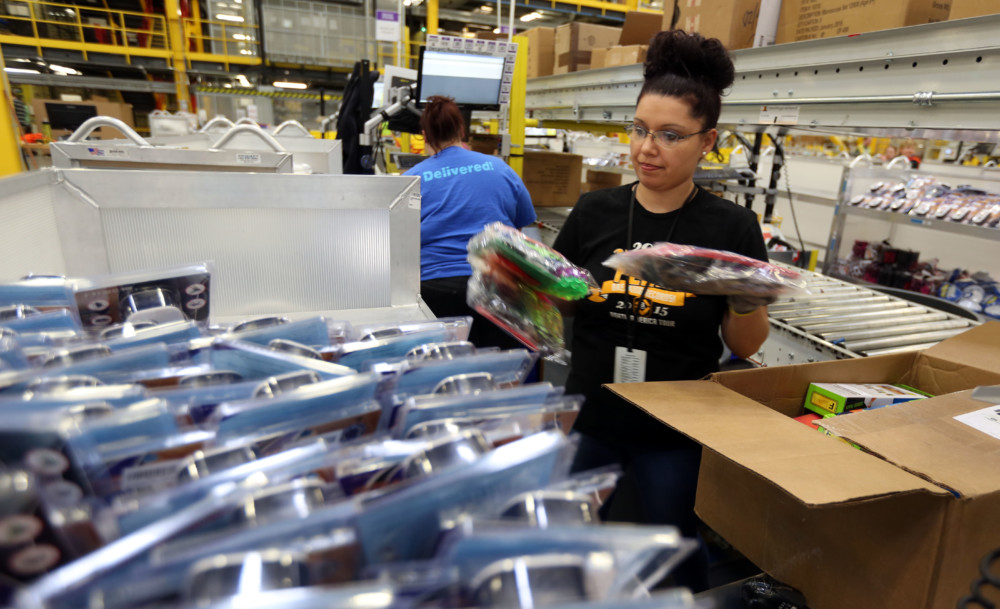By Robert Reed
Chicago Tribune
WWR Article Summary (tl;dr) When it comes to security and workplace privacy, employees don’t enjoy many protections. As Robert Reed reports, emerging biometric and other devices could make matters worse.
Chicago Tribune
As you work, Big Business is watching.
Companies are increasingly tapping into new technology designed to keep a close eye on employees. This monitoring goes beyond traditional security cameras to include portable devices worn by workers.
As the Tribune has reported, Amazon recently won patents for high-tech wristbands that could be used by its e-commerce warehouse and distribution staffs. Designed to track worker hand movements as orders are filled, the products, if made, could eventually be integrated throughout Amazon’s ranks, including its estimated 8,000 Illinois workforce.
A few companies are toying with implanting microchips under workers’ skin. With a wave of the hand, employees could get into secured plants, office campuses or food courts, no more fumbling with electronic cards or passes.
Scared yet? You probably should be.
When it comes to security and workplace privacy, employees don’t enjoy many protections and these emerging biometric and other devices can make matters worse.
“Generally in the workplace, there isn’t a right to privacy,” says Melissa Ventrone, a privacy attorney in the Chicago office of law firm Thompson Coburn.
That’s for sure.
Without getting into too much legal nitty-gritty, management can look at most anything a worker creates on the job or with company equipment. That means emails, social media posts, internet searches, text or instant messages and GPS devices that track employee whereabouts.
Now, however, employers are beginning to take a much more intimate approach to following workers. One growing method is using time clocks that scan an employee’s fingerprint, retina or iris.
Some workers are ticked off about it and fighting back. Up to 30 class-action lawsuits were filed by late 2017 accusing companies of violating the Illinois Biometric Information Privacy Act, which governs how such sensitive information is collected and used.
Illinois is among a handful of states with a law that polices biometric monitoring in the workplace.
These lawsuits typically argue that employers didn’t give workers enough advanced notice of the new work rule, or didn’t ask their permission to collect their data, according legal research presented by the Society for Human Resource Management.
While these are serious issues, the workplace concerns travel farther than providing proper notice. Biometric and motion monitoring also open up a panoply of possible abuses and misuses that have to be recognized and hashed out.
For instance, let’s say employees are provided Fitbits or another portable health monitor as part of a corporate wellness program. Can the personal data gleaned be used to alter, or deny, access to employer-provided insurance plans?
Perhaps a wrist-monitoring device shows workers aren’t keeping pace with management’s expectations. Does that data help foster discriminatory or sweatshop treatment by the bosses? Maybe it makes the case for firing people and using more robots?
“Are the bathroom breaks too long? Are you chatting with co-workers? Wasting any time? These devices show if you’re working at maximum efficiency,” says Paula Brantner, senior adviser at employee rights group Workplace Fairness.
Another nagging concern: What if this sensitive personal information is hacked? What are the rights of employees whose personal records are at risk and may be misused?
Admittedly, this is a dark, but not unrealistic, take on emerging workplace monitoring systems.
If used prudently, biometric and other devices can help improve corporate operations. An Amazon wristband could provide tips on how to cut down on repetitive stress injuries, says Thompson Coburn’s Ventrone.
And there are settings, like a Boeing defense system plant or design operation, that require greater workplace security, even at the expense of some workers’ personal privacy.
The workplace is changing and technology is a huge driver of that transformation. New approaches are inevitable and should be welcomed.
But when it comes to worker security and privacy, Big Business isn’t supposed to become Big Brother.














































































































































































































































































































































































